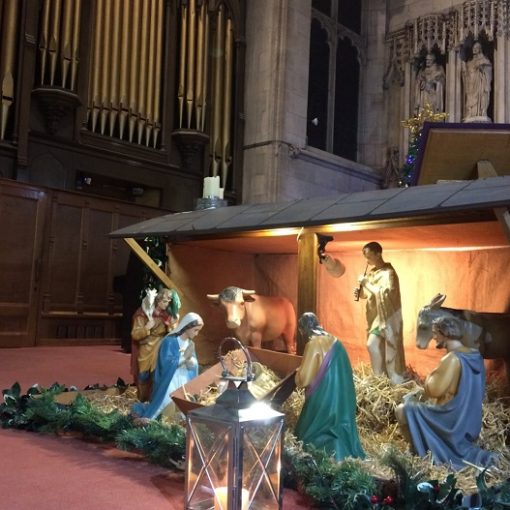 Music for Reflection Series 2018
Music for Reflection Series 2018
Wednesday 29th August – 1.15 p.m.
Part of the Imagine Peace Season
Paul Carr – Organ
Programme notes by Eric Lunt
Paul has chosen to open and close his programme with two dazzling works which pay tribute to the sun. Both pieces were written a few years after the end of one of the world wars of the 20th century and seem to reinvest creation with hope and light after a period of desolation and darkness. That the nearly blind Vierne especially was able to compose in this way after losing a son to the horrors of war in 1917 is little short of miraculous and a profound tribute to his faith. Peeters sketched his Lied Symphony while on a concert tour of America in 1947 and its five movements (to the ocean, the desert, the flowers, the mountains and the sun) are a personal response to the beauty of the natural landscape which he saw on his journeys. Lied to the Sun is a brilliant toccata, allegro viva, which will round off today’s programme in style. As you listen to each of these works reflect on the words of the poem by Delavigne which was Vierne’s inspiration: ‘Du soleil qui renaît bénissons la puissance. Avec tout l’univers célébrons son retour.’ (‘Let us bless the power of the reborn sun. With all the universe let us celebrate its return.’)
During his time in Weimar Bach was influenced greatly by the music of Vivaldi and transcribed a number of his orchestral works for solo harpsichord or organ, and no doubt learnt much about contrapuntal writing in the process. BWV 593 is an arrangement (one might even say a refinement!) of Vivaldi’s famous Concerto for Two Violins in A Minor, RV 522 No. 8, from L’Estro Armonico.
Gustav Holst began work on his orchestral suite The Planets just as the First World War was beginning, and its opening movement Mars – The Bringer of War, conveys much of the composer’s sense of horror at the violence, brutality and sheer stupidity of human conflict. The suite’s second movement, Venus – The Bringer of Peace, which we hear today in an arrangement for solo organ, dissipates the brutality of the first movement with its relaxed lyricism, restoring a state of poise and dignity. Yet it is not simple in harmony and texture and some of the themes are fragmented. Like the peace which came after 1918 repose was only temporary and far more challenges remained (and, clearly, still remain) on the human journey.
John Stanley’s Trumpet Voluntary requires little introduction. Stanley was a good friend of Handel and conducted many of Handel’s works in and around London, but was most famous as the organist of St Andrew’s Church, Holborn. His three volumes of organ voluntaries from which this piece is taken are perhaps his most enduring and popular legacy.
Rubrics – A Liturgical Suite for Organ – was commissioned from Dan Locklair in 1988 and first performed in Pittsburgh in April of that year. Each movement takes its inspiration from the rubrics in the Book of Common Prayer and it is possibly one of the most frequently played organ works by an American composer. It featured in the funeral service of President Ronald Reagan, and during the inauguration of President Obama was played in memory of Martin Luther King Jr. at Washington National Cathedral.
Louis Vierne (1870-1937)
Hymne au Soleil from Pièces de Fantaisie Suite 2
Op. 53 No. 3
Johann Sebastian Bach (1685-1750)
Allegro Antonio Vivaldi (1678-1741)
Concerto in A Minor after Vivaldi (BWV 593)
Adagio
Allegro
Gustav Holst (1874-1934)
arr. Arthur Wills (b. 1926)
Venus – The Bringer of Peace from The Planets
John Stanley (1712-1786)
arr. Henry Coleman (1888-1965)
Trumpet Voluntary
Dan Locklair (b. 1949)
‘The Peace May Be Exchanged’ from Rubrics, A Liturgical Suite for Organ
Flor Peeters (1903-1986)
Lied to the Sun from Lied Symphony Op. 66
 Music for Reflection Series 2018
Music for Reflection Series 2018


